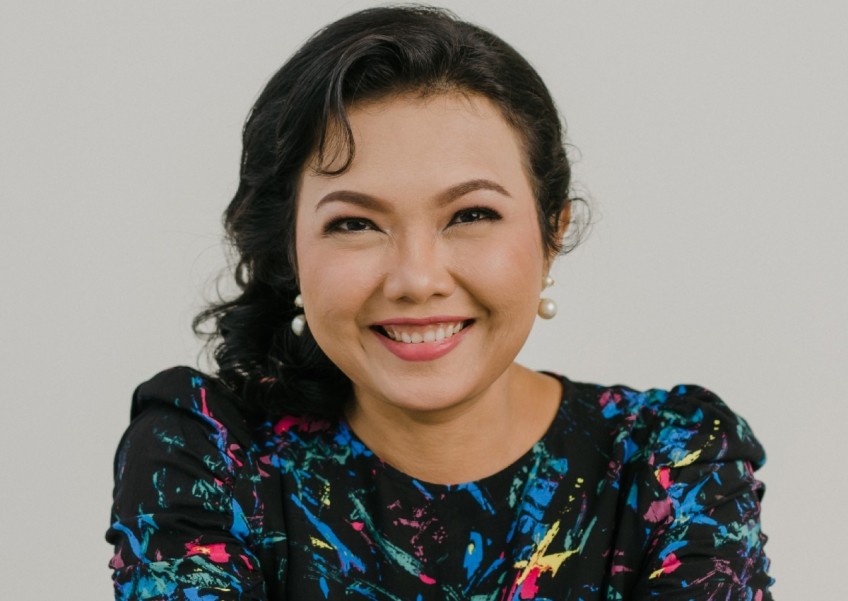'Be our ally': Sex therapist speaks about sexual wellness in women and how men can help


 PUBLISHED ONMarch 08, 2024 5:36 AMByAmierul Rashid
PUBLISHED ONMarch 08, 2024 5:36 AMByAmierul RashidTo mark International Women's Day on March 8, AsiaOne will be spotlighting inspiring women from different walks of life. You can find them all here.
Being a sex therapist, Dian Handayani's profession easily doubles up as an icebreaker when meeting strangers.
The Singapore-based Indonesian giggled as she recounted to AsiaOne instances when others have inadvertently blushed or raised their eyebrows upon hearing of her choice of work.
"They'd either come closer to ask more questions or just walk away!" she chirped.
Not that it ever bothered her, of course.
After all, Dian is a healthcare professional all too happy to help improve her clients' sex lives.
The big difference is that the topics covered in her sessions can get somewhat steamy (or uneasy), depending on your goals when you sit in with her.
During our chat, Dian's infectious energy goes up a notch whenever sex therapy becomes the main subject matter.
Dian, who is in her 40s, is clearly passionate about her work but interestingly, her journey to this role wasn't a linear one.
Dian studied art therapy at Lasalle College of the Arts and after her graduation, her career, she recounted, was fairly smooth sailing.
But she then went through an "existential crisis" in 2016.
Recounting the exact moment, she mentioned that it was simply a case of being "hungry for something different".
It was back to the drawing board, once again.
"I began looking into the impact of body image and shame [on sexuality]," Dian said.
This piqued her interest in learning about the multi-disciplinary science that is sexology — from human sexual interests, gender and functions among others.
Dian then put in the hours to get trained as a qualified sex therapist and certified sex coach at the University of Sydney and Sex Coach U.
So don't be fooled, her job isn't simply a sit-down talk about the birds and the bees.

But who opts for sex therapy sessions anyway?
For one, she dismisses the notion that sex therapy is about "enhancing" or "fixing" anything within the four walls of the bedroom.
To her, it's more accurate to understand her role as a healthcare professional who is trained to help people with issues related to sex.
Dian continued: "I see it as more of an opportunity for growth. It's about reconnecting with your body."
Common issues she'd come across include clients who struggle with pain during penetrative sex or having low sex drive.
The biopsychosocial model also comes in when issues like shame comes into play, she said.
A biopsychosocial model stresses the interconnectedness of biological, psychological and social factors in relation to health.
Dian's role as a sex therapist is to help her clients navigate this frustrating path in order for them to "befriend their own body".
What gives her great joy is seeing clients reach a place of accepting themselves and being able to grow from such experiences.

Diving into the nooks and crannies of sexual wellness, we asked Dian if sex should ever be goal-oriented.
Looking alarmed, she quickly responded: "Please, no. Goal-oriented sex is so stressful! And it's probably what's causing a lot of the issues."
Dian swiftly alerted our attention to a 2007 peer-reviewed study that exhaustively listed out 237 reasons why people have sex — reasons ranging from being bored to desiring emotional closeness.
"See, it's broad! At the centre of it, we want to have pleasure."
Now, that's easier said than done, especially through a woman's lens.
It was at this point when we received a mini-lesson on the sexual script theory. Basically, it states that all social behaviour (including sexual behaviour) is socially scripted.
Problems arise when these scripts have been internalised to the point that it impacts one's ability to receive pleasure, Dian explained.
An example she brings up is the rather patriarchal narrative that, in the context of a cis-gender heterosexual relationship, a woman "has to make the man happy".
Dian calls it out as rather insidious, as a woman might end up being in a state of fear.
It could be a matter of sex feeling uncomfortable but not brought up for discussion or feeling afraid to admit that particular sexual activities are pleasurable.
"So we endure a lot and that's hard, right," she mentioned.
[[nid:649465]]
Endure, fear, admit.
Even the semantics used in Dian's examples have a sense of negativity attached to it.
Is it any wonder that women can struggle with finding sexual wellness?
While it might come across as a women-only issue, let's not forget that the reasons behind a woman's struggle for sexual wellness are societal.
Men can't be escaping scot-free.
Dian is also fully of the belief that men play a role in women achieving sexual wellness.
"Be our ally. Challenge your own perceptions and myths," she said.
If a woman is unable to orgasm from vaginal penetration, does that make the man a "bad lover"?
But research — from a 2017 study on women's sexual pleasure — shows that only 18 per cent of the women surveyed orgasmed from vaginal penetration alone.
Clitoral stimulation (37 per cent) provided a much higher chance of achieving the big O.
"Most of us orgasm that way yet a man might feel threatened if a woman introduces sex toys," Dian said.
She challenges men to be open and normalise conversations about sex.
This will allow for myth debunking and potentially create a safer space for women to achieve their personal sexual wellness.
No part of this story or photos can be reproduced without permission from AsiaOne.